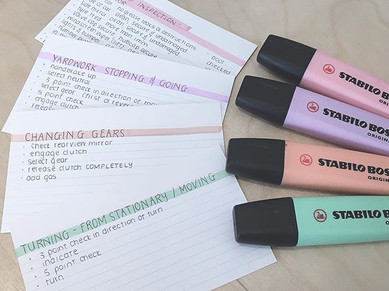How I Aced Matric (and you can too!)
- Smart Girl
- Mar 28, 2019
- 5 min read
My first year of college is now well under way, but I realized that I still hadn't written a proper blog post since my matric results came out. To catch all of my foreign readers up: I live in South Africa where we affectionately call our Senior Year 'Matric'. Our education system is a little different in that we don't write separate college entrance exams such as SATs, instead you use your final high school results. Because I attended a private school, I wrote a different set of exams to the national exam (but both exams are moderated by the same body).

A little disclaimer: although I am incredibly proud of the results that I was able to achieve during my high school career, I feel that I need to explain that I was only able to achieve some of the things that I did because I significantly compromised my social life and although this paid off for me, it certainly isn't healthy and I missed out on much of what can make high school an incredibly special time of your life as a result of it...
I took 8 subjects in my senior year: Math, English, Afrikaans, Geography, Physical Science (which includes both Physics and Chemistry), Business Studies, Life Orientation and Advanced Program Math. By the time I started my senior year, I already knew which subjects should be smooth sailing and which could present a challenge. I prioritized studying for Physical science as it was the subject that I found most difficult and I had significantly more content to cover than in my other subjects. I also decided to prioritize math (although this was arguably my strongest subject) because I knew that it was a crucial foundation for the degree that I am currently studying. It's important to remember to look beyond your immediate needs and to consider what might make your life easier down the line (and boy am I glad that I put the amount of time and energy into math that I did!)
I've realized that one of the biggest challenges for South African matric students is time management and covering the sheer quantity of work in what is an unusually short year. Below I have put together some of the techniques I used to ensure my success at the end of last year:
At the very beginning of the year, make a list of the content that you have to cover for each subject before your final exam (ideally, do this in the form of a checklist). It is also a good idea to compile a list of the tests and assignments that you'll be completing throughout the year if you have access to these. Click here to download a subject overview template which you can use to track your progress for each subject.
Use step 1 to plan - work out how much studying you need to get done over the weekend and how much time you need to spend on different elements of school work every day (projects, homework, essays and speeches are all things that you have to do outside of studying in order to be successful). Every Sunday night I would use this weekly planner to put together a quick overview of all my priorities for the week and then used this study timetable for prelims and exams (when the focus was more on studying than assignments and homework).
Avoid falling behind! Complete assignments as soon as you possibly can. Just because you don't have something due the next day, doesn't mean that you can afford to take the day off. I used an app to keep track of all my tests, homework and assignments (there are tons of free apps available for this purpose) and I had a personal rule that I couldn't go to bed at night with more than 10 things on my assignment list - this may have kept me up late at night once or twice, but it definitely saved me a lot of headaches in the long run.
Use every spare minute you can get your hands on (this one is very closely linked to point 2). Use your free lessons - it's no secret that teachers don't always teach during every lesson - this is your opportunity to get a little work done and maybe even get yourself into bed before midnight for once! And any good student knows that every now and again, you may have to sacrifice a lunch break to get something done.
Make notes cleverly. Hand-written notes are incredibly effective for memory retention, but they're not necessarily ideal for covering large volumes of content (especially for subjects like literature). It is important to know when to type notes or write them out manually (I usually recommend making hand-written notes for topics where processes and diagrams are important, such as in science and typing notes for very theoretical topics like history and English).
Consult your teachers. Most self-respecting teachers are willing to go above and beyond for their students, especially when they ask. When you get a result back, make an appointment with your teacher to discuss where you went wrong and what areas you can work on (this also tells your teacher that you're invested in your marks and may make them a little more sympathetic when you ask for the rare extension).
Play the game - I have very mixed feelings about this tip because it goes against everything I believe about education, but unfortunately the South African education system (and most others) are not ideally designed to encourage critical thinking & sometimes the syllabus is simply just too big to be able to obtain in depth understandings of every topic. Occasionally it may be in your best interests to parrot learn certain sections rather than wasting time on trying to understand them in depth (but! only do this when you are certain that you know what types of questions will be asked on this section in the final exam).
Practice! As previously mentioned, the South African education system is incredibly formulaic, which might not be great from a critical thinking point of view, but it certainly lends itself to past papers. Past papers are readily available all over the internet and they give excellent insight into the format of the exams and the types of questions that you can expect (furthermore, having practiced lots of past papers before your final exam will give you a fair amount of insight into how you should manage your time). It should also hopefully leave you feeling a little more confident when you walk into your final exam (it's always nice to know that you know how to do something and have a pretty good idea of what to expect).
This one was particularly difficult for me, but ask for help. I was lucky to have an incredible amount of support from my family and my teachers. I was also the student head of academics during my matric year and this added quite a substantial amount to my workload - my mom was amazing, she would sit up with me late at night cutting out chill pill labels and doing anything else she could to help take some of the pressure off of me.
Lastly, don't burn out... Matric is incredibly demanding and too many late night study sessions too early on in the year may just leave you too exhausted to put in the time and energy necessary closer to your exams. By managing your workload and avoiding procrastination, you should hopefully be getting just enough down time to prevent burnout later on in the year.
I hope that you find this little blog post useful. I hope to be writing a few more posts soon on different note taking techniques which may also provide you with a little guidance through the craziness of matric. To all of my amazing readers who are writing matric any time soon - good luck & happy studying!
Also, I'd love to hear what you think of this blog post and my little list of tips of acing matric - please feel free to comment below and share any tips and tricks that you may have come across!












